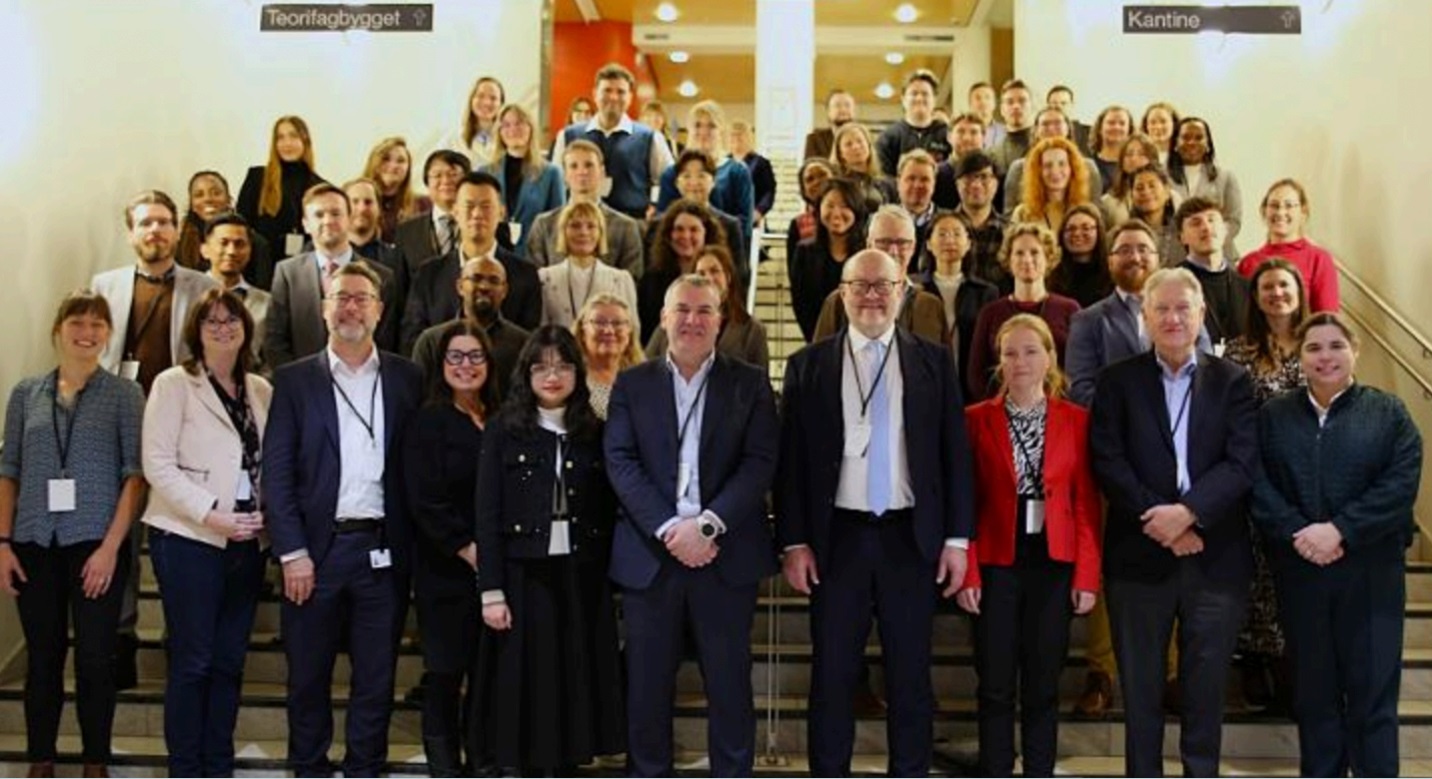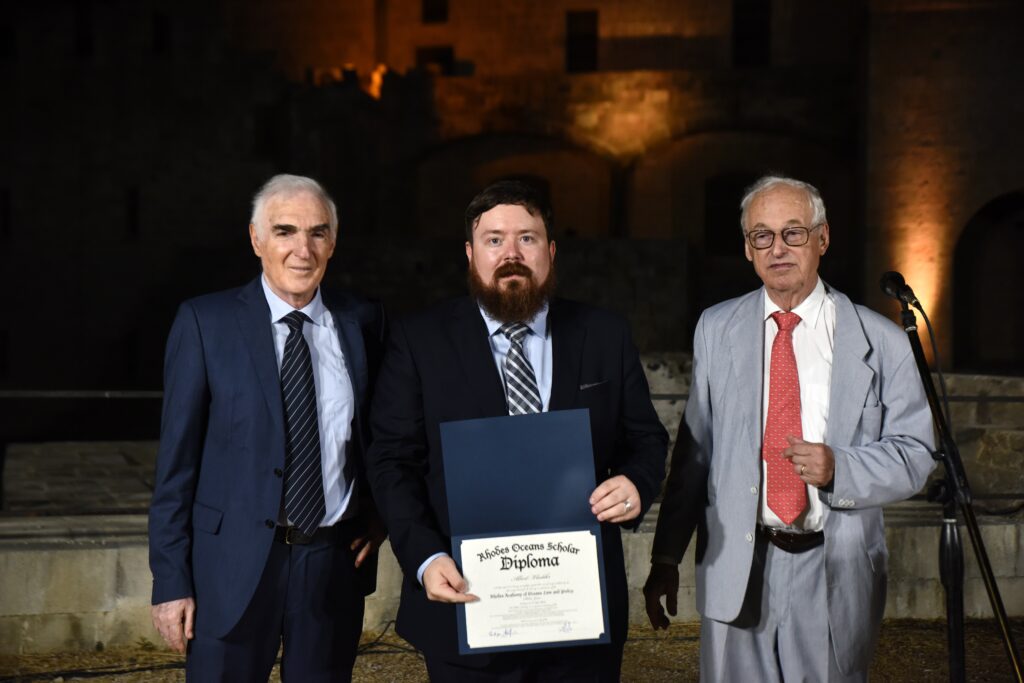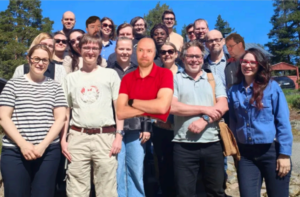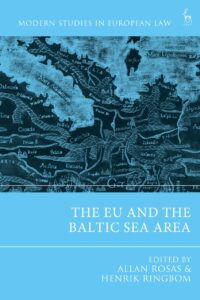Åbo Akademi/BALEX hosted the Finnish environmental law society in Turku on 26-27 May 2025. See program at https://www.sysry.fi/.
Category: News & Events
Conference of the CMI, 12-17 May, Tokyo
Henrik Ringbom attended the Conference of the CMI (Comité Maritime International), which is the main event of the year for maritime lawyers worldwide. This year’s conference took place in Tokyo on 12-17 May 2025. Henrik contributed with a presentation on legal issues (public and private law) linked to remotely operated ships, and on a discussion panel on Maritime Autonomous Surface Ships (MASS).https://cmi2025tokyo.org/
2025 International Cable Protection Committee (ICPC) Plenary, April 15th – 17th, Montreal
I was invited to speak at the 2025 ICPC Plenary in Montreal this past week. This invitation resulted from my paper last year (See past post). Although I could present any related topic, I decided to share the first part of my paper, regarding extraterritorial jurisdiction of intentional sabotage of submarine cables. I also discussed the recent submarine cable damage incidents in the Baltic Sea. As far as I know, no Finnish company or government delegation was in attendance, and none holds member status.
This year’s plenary theme was ‘The Big Squeeze: Geopolitics & Spatial Planning’. There were various presentations from companies (members and non-members) involved in the submarine cable industry. The presentations covered a wide gambit of topics within the theme, including the environment, legal issues, case studies, and emerging technologies.
After my presentation on the second day of the plenary, I was formally presented with my award. It was a nice touch on a very well-organized and informative event. I hope to attend in the future.
Maritime Security Event, April 4th, Tallinn
Henrik Ringbom attended a maritime security event in Tallinn, organized by the Foreign Ministry in Estonia, on 4 April 2025, focusing on new threats to submarine infrastructures, such as cables and pipelines. He also provided expert advice on this issue to the Finnish Foreign Ministry (13 February 2025), the Communication Committee of the Finnish Parliament (18 February 2025) and the Foreign and Defence Committees of the Swedish Parliament (5 June 2025). https://www.justdigi.ee/en/news/international-conference-critical-submarine-infrastructure-held-tallinn
Meyer Turku Biodiversity Reporting Project
This fall, I was granted an opportunity to work on a project with the shipyard in Turku, Meyer Turku. This so-called biodiversity project aims to provide a basis for a biodiversity program including short- and long-term action points for Meyer Turku. More specifically, the task has been to define biodiversity and identify what legislation regarding biodiversity is relevant for Meyer Turku.
The biodiversity project is a one-and-a-half-year-long project consisting of three work packages (WP). WP1 focuses on the legal aspects of reporting biodiversity legislation, WP2 on the shipyard’s current biodiversity status, and WP3 aims to identify potential actions to be taken and suggestions for a biodiversity program. I work on WP1 with another doctoral student and two professors from Åbo Akademi University.
My work on the project is to produce a report together with the others in WP1. It aims to help the shipyard better understand what current and (to some extent) future legislation and regulations are required for it to become “the most sustainable shipyard in the world.” The European Union (EU) has adopted reporting legislation that companies must adhere to to become more environmentally sustainable. These include, for instance, the EU Taxonomy Regulation and the Corporate Sustainability Reporting Directive (CSRD). Meyer Turku will have to report on matters of sustainability in accordance with the European Sustainability Reporting Standards (ESRS) regarding, among other things, general disclosures, impacts, risks, and opportunities.
GHG seminar Oslo, 10-11 December
A seminar on ‘Decarbonizing the Shipping Industry – Law Perspectives’ was organized in Oslo on 10-11 December 2024. Henrik Ringbom was one of the organizers and speakers at the event, which analyzed public and private law perspectives of international and EU developments in the green transition in shipping. The full program, including presentations, can be found here: https://www.jus.uio.no/nifs/english/research/events/2024/2024-12-10-11-greenhouse-gases-and-shipping.html
EMSA AB, 27-28 November
The Administrative Board of the European Maritime Safety Agency, of which Henrik Ringbom is a member since 2017, met for its 71st meeting on 27-28 November in Lisbon. https://www.emsa.europa.eu/about/administrative-board.html
Research Seminar MATINE, 19 November
Jouni Honkala attended a research seminar, organized by the Finnish Ministry of Defence, MATINE, on 19 November. New research results of MATINE projects were presented in the seminar, of which autonomous systems and especially autonomous subsea surveillance systems and their applications raised large interest.
Stockholm Security Seminar (Svensk sjöfart), 15 October
Henrik Ringbom was invited to participate at an event on maritime security enforcement in Stockholm on 15 October, giving a speech on the shadow fleet and sabotage activities in the Baltic Seas. The event was organized by the shipping organization Svensk sjöfart and covered by the magazine Sjöfartstidningen’s November issue.
Tromsö, 6-7 November
The annual conference of the Norwegian Centre for the Law of the Sea (NCLOS) took place in Tromsø, Norway, on 6-7 November 2024. The theme of the conference this year was ‘Future Trajectories for the Law of the Sea’. Henrik Ringbom from ÅA/BALEX participated and gave a presentation entitled ‘The Irrelevance of UNCLOS for Regulating Ship-Source Pollution Today – The Case of Climate Change’.
The program of the entire conference is found here.

Bryssel COST, 31 October
A new EU Cost Action that focuses on human rights and the sea, Blue Rights, started its activities on 31 October. The Action aims to assess, from a legal perspective, how human rights can be enjoyed also by people at sea and by all people at sea. It will answer two fundamental questions: What is the content and scope of the rights to life, liberty and health when applied at sea and who is responsible for protecting them and how? Henrik Ringbom is a member of the Management Committee of the Action and also a co-leader of one of the sub-working groups. The first inaugural meeting of Blue Rights took place in Brussels on 31 October 2024.
Link https://www.cost.eu/actions/CA23103/

Croatia, 16-18 September
Henrik Ringbom was invited by the Croatian Maritime Law association in collaboration with several universities, to participate in two events in Dubrovnik in September. First, he gave a keynote speech at the Maritime Law Colloquium “In Search For Regulatory Approach to Autonomous Vessels” on 16 November, whereafter he gave a lecture on ‘Greenhouse gases as Opposed to Traditional Marine Pollution – Regulatory Perspectives’ at the International Maritime and Transport Law Course, this year entitled ‘Transport Law de Lege Ferenda 2024’.
Centre for Sustainable Ocean Science (SOS) kick-off conference 10-11 September 2024
The newly established Centre for Sustainable Ocean Science (SOS) at Åbo Akademi University held its kick-off event from September 10 to 11, 2024, at Sibeliusmuseum and Arken. Research assistant Malla Lehtonen coordinated the event. I (Anton Eklund) volunteered to help with it with a few others.
SOS is an Åbo Akademi University Centre of Excellence, launched in 2024 and funded by the Åbo Akademi University Foundation (Stiftelsen för Åbo Akademi) from 2024 to 2028. SOS provides transdisciplinary knowledge on wicked problems linked to marine biodiversity and its role in the societal transition to sustainability, focusing on the Archipelago Sea and Åland Island area. The inter- and transdisciplinary work in SOS includes environmental and marine biology, chemistry, industrial management, political science, law, and the arts. Read more on their website: Centre for Sustainable Ocean Science
The kick-off event addressed inter- and transdisciplinary research and co-creation questions, especially in the context of sustainability transitions. The program included talks, presentations, and panel discussions that brought together viewpoints from various fields. Some of the speakers included Dr. Rachel Kelly (Knowledge Broker, Centre for Marine Socioecology (CMS), Australia), Risto Veivo (City of Turku), Vespa Laine (Fern Orchestra), and Katja Bonnevier (Archipelago Sea Biosphere Reserve).
NATO Conference, 2-5 September
The 10th annual Conference on Operational Maritime Law was organised from 2-5th September 2024 at the University of Ljubljana by the NATO Centre of Excellence of Operations in Confined and Shallow Waters, in cooperation with the Republic of Slovenia Ministry of Defence. Åbo Akademi/BALEX was represented at the Conference by Jouni Honkala. One of the main topics was the overall challenge of protecting of critical infrastructure at sea from the perspectives of the law of the sea, on operational perspective, economic perspective and the international law perspective. The Vignettes introduced the participants to very actual and challenging issues of the situation in the Indo-Pacific Ocean. The operations of China in the East China Sea, Taiwan and South China Sea were also heavily on the agenda. Various scenarios of hybrid activities in the Baltic Sea and the Red Sea region were assessed. New developments in autonomous and unmanned systems were approached from the view of commercial use (Maritime Autonomous Surface Ships, MASS), navy deployment and the recent Newport Manual.
Nordiskt sjörättsseminarium Mariehamn, 2-4 September
Åbo Akademi had a key role in organizing the 30th Nordic Maritime Law Seminar in Mariehamn, Åland Islands, on 2-4 September. This seminar is organized bi-annually by the Scandinavian Institute of Maritime Law, at the University of Oslo, and has been the leading maritime law event in the Nordics since many decades.
Örö, 15-17 August
Åbo Akademi organised and hosted on 15-17th of August 2024 the annual ‘summer seminar’ (which is organized jointly with Stockholm University since for decades, every second year in the Finnish archipelago, every second year in the Swedish archipelago) on altered the security situation in the Baltic Sea. The participants were academic and other experts from Finland and Sweden, and included persons closely linked to BALEX . The topics covered a broad range of issues, including the effects on the changed security of the Baltic Sea to maritime law, hybrid operations, the effect of NATO membership of Finland and Sweden to shipping, security of supply, jurisdictional issues linked to sabotage to underwater cables and pipelines, including the NordStream case, possible private tort law claims on Baltic Connector, and effects to maritime labour law. Henrik Ringbom, Al Vlodder and Jouni Honkala participated.
Rhodes Academy 2024
This summer, I had the privilege of attending the Rhodes Academy for Ocean Law and Policy in Rhodes, Greece. The program ran from June 23rd to July 12th. It was an intensive three-week course on the law of the sea with lectures from some of the most accomplished in the field, including current and past judges of the International Tribunal of the Law of the Sea (ITLOS), practicing the law of the sea lawyers, and a negotiator from UNCLOS III. One of the most enjoyable parts of the program was the group workshops, which took place on Tuesday and Thursday afternoons. There were often elaborate group exercises, which ended in student presentations and, often, lively debate! While UNCLOS and the law of the sea were the primary topics of discussion, there were lectures on ocean geology, hydrography and climate change.
The course was comprised of 50 students from around the world with varying educational and professional backgrounds. The program was not just lectures, studying and tests. There were many organized events, including day trips to Lindos on Rhodes Island and the Island of Simi.
The program culminates in an oral exam on the final Friday (there was a written exam on the second Friday), followed by an evening tour of the Palace of the Grand Master of the Knights of Rhodes and the graduation ceremony outside near the palace. It was a wonderful experience, and I recommend it to others looking for an intensive introduction to the law of the sea and a chance to meet and network with many in the field.

OSW seminar Husö, 7-8 June
On, 7-8 June, back-to-back with the NESS conference, we organized a special writing seminar on legal issues linked to off-shore wind farms in Husö, Åland Islands, and on the ferry there. The outcome of this seminar, entitled, ‘Harnessing the Wind: Offshore Wind Power’s Regulatory Framework, will be published in a special issue of the Oceans Development and International Law journal in late 2025.
NESS, 4-6 June
Åbo Akademi was the main host and organizer of the 16th NESS – Nordic Environmental Social Science Conference, on 4–6 June 2024 in Turku. Among the 27 workshops linked to the event, one was specifically dedicated to legal and governance issues linked to critical marine infrastructure. This workshop was co-organized by co-organized by Gabriela Argüello from the University of Gothenburg and Henrik Ringbom from ÅA/BALEX
Link: https://ness2024.fi
Rhodes Academy-ICPC Submarine Cables Writing Award for 2024 Given to Albert Vlodder
Åbo Akademi and Balex’s Albert Vodder was awarded the Rhodes Academy – ICPC Submarine Cables Writing Award for 2024. His paper, titled ‘The Consequences of Damaging Submarine Cables: An Examination of the Applicability of Effects Jurisdiction over the Unlawful Act of Damaging Submarine Cables on the High Seas,’ was chosen as the winner in the International Cable Protection Committee and Rhodes Academy’s annual competition. The award is either a guaranteed admission and a full scholarship to the Rhodes Academy of Oceans Law and Policy or a cash prize.
Albert will attend the Rhodes Academy this summer in Rhodes, Greece. The press release for the award can be found here.
CMI Göteborg, 22-24 May
Henrik Ringbom from ÅA/BALEX participated in the CMI Colloquium in Gothenburg on 22-24.5, presenting the CMI’s work in the field of autonomous ships, both at the working session of the International Working Group on MASS on 22 May and at the main colloquium conference on 23 May.
Link: https://comitemaritime.org/event/gothenburg-colloquium/
Sea Seminar, Kultaranta 14-15 May

The Åbo Akademi Sea Profiling area organized on 14-15th of May, in cooperation with the Centre for Sustainable Ocean Science (SOS), a research seminar in Kultaranta, Naantali, where PhD candidates and others had the opportunity to present their papers. Al Vlodder, Jouni Honkala and Henrik Ringbom participated in the two-day event.
IMO LEG 111 (22-25 April)
Henrik Ringbom participated, on behalf of the international maritime law association, the Comité Maritime International (CMI), in the 111th session of the Legal Committee of the International Maritime Organization (IMO), mainly to participate in the discussions on Maritime Autonomous Surface Ships (MASS). One of the key documents discussed at the meeting was a submission by the CMI on the civil liability aspects of autonomous ships, in which Henrik had a key role in drafting it.
Haugesund International Conference, 16-17 April
The main topics of Haugesund International Conference on 16-17th of April 2024 were Maritime Security, Naval Warfare, and the Law of the Sea. Jouni Honkala attended. The conference covered a broad range of topics related to maritime security and safety, like the protection of seabed infrastructure, the activities of public authorities in relation to the above mentioned, and innovative maritime safety solutions and maritime technology development by companies, the utilization of unmanned vessels and crafts for protecting gas pipelines and other infrastructures and for military use. The conference also addressed current issues and actions that threaten maritime safety and security around the world, including notably the recent gas pipeline and submarine cable cut-offs and the terrorist attacks in the Red Sea.
Stakeholder event, Protect Baltic project in Hanasaari, Espoo (29 February)
The inaugural stakeholder event for the PROTECT BALTIC project took place in Hanasaari, Espoo, on 29 February 2024. ÅA-law, who leads the legal work package of the project, was represented at the event by Henrik Ringbom and Niels Krabbe. The Protect Baltic project, managed by Helcom, is a Horizon Europe-funded initiative that aims to address the challenges of expanding marine protected areas (MPAs) and ensuring their effectiveness in the Baltic Sea region.
See more on the stakeholder event here https://helcom.fi/helcom-at-work/events/helcom-stakeholders-confrences/bsc2024/ and on the Protect Baltic project here: https://protectbaltic.eu
‘The EU and the Baltic Sea Area’ Book Launch
 Today, we celebrated the latest BALEX publication, the book ‘The EU and the Baltic Sea Area,’ co-edited by Allan Rosas and Henrik Ringbom. At the launch we heard from several of the contributers as well as from both editors.
Today, we celebrated the latest BALEX publication, the book ‘The EU and the Baltic Sea Area,’ co-edited by Allan Rosas and Henrik Ringbom. At the launch we heard from several of the contributers as well as from both editors.
This book explores the role of the European Union (EU) in the cooperation and regulation of the Baltic Sea Region (BSR), from both an institutional and substantive perspective. It particularly focuses on the role of the Union in advancing the broader marine governance framework in the region. Questions investigated include: in what way does the Union participate in, or otherwise influence, the activities of States, international organisations and other actors involved in BSR cooperation and regulation, and what is the importance and substantive outcome of the Union’s specific role in this respect? How has the membership of eight out of nine Baltic Sea coastal States in the EU affected cooperation in the region, in terms of substance as well as procedure, and what is the influence of the BSR over the EU? These questions are discussed from different perspectives by leading experts in both the fields of EU law and the law of the BSR.
The book can be found here and on other platforms.
